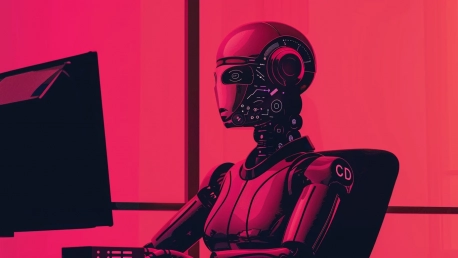Generative AI is taking the software development world by storm, offering unprecedented capabilities in code generation and optimization. As tools like GitHub’s Copilot and OpenAI’s ChatGPT become more integral to developers’ workflows, they are not only enhancing efficiency but also introducing new dimensions to software security. This significant shift has led to both excitement and trepidation, as the introduction of AI-generated code brings forth positive changes as well as pressing challenges. This article delves into the transformative impact of generative AI on software development security, examining how it can both bolster and jeopardize security protocols.As developers increasingly rely on AI tools to automate coding tasks, the technology not only accelerates the development process but also allows for more complex and innovative solutions. The ability to generate and optimize code using pre-trained models has marked the advent of a new era in software engineering. However, this rapid adoption is not without its complications. The widespread embrace of AI-driven practices comes with an array of complexities and new vulnerabilities, which traditional security measures find challenging to address. Thus, a comprehensive reassessment of security strategies has become essential to maintain robust standards in this evolving landscape.
The Rise of AI-Generated Code
Generative AI tools are fundamentally transforming how software is crafted, thereby revolutionizing the software development industry. By automating various coding tasks, tools like GitHub’s Copilot and OpenAI’s ChatGPT harness pre-trained models to create and refine code. This automation powers an accelerated development process, enabling developers to produce software applications more quickly and efficiently. Moreover, the sophistication of AI-generated code allows for the creation of more intricate and innovative solutions, pushing the boundaries of conventional software development.This transformative shift has led to a significant surge in the adoption of AI tools, with developers increasingly integrating them into their workflows. However, this widespread use also brings a heightened level of complexity that inevitably impacts security. Traditional security measures and tools, which were designed to handle manually written code, often fall short when it comes to identifying and mitigating the unique vulnerabilities specific to AI-generated code. Consequently, developers and security professionals are compelled to rethink and update their approaches to ensure that security standards remain uncompromised in this new era of software development.
Unique Security Risks and Vulnerabilities
The transition to AI-generated code introduces a set of distinctive security risks that demand attention. A primary concern revolves around the quality of the training data used to develop AI models. Much of this data is sourced from open-source repositories, which may lack the security rigor found in commercially vetted codebases. This practice raises the risk of propagating existing vulnerabilities or even introducing new ones into the software—essentially leading to a “garbage in, garbage out” scenario. The AI models, learning from potentially insecure code, could inadvertently produce software riddled with vulnerabilities.Moreover, the inherent complexity of machine-generated code complicates the detection of anomalies by traditional security tools. The black-box nature of deep learning models used in AI tools further exacerbates the issue, as the underlying logic that generated the code remains obscured. This opaqueness makes it challenging for security professionals to scrutinize and validate the code adequately. As a result, the industry faces an urgent need for more advanced security tools specifically designed to handle the intricacies and vulnerabilities of AI-generated code, ensuring the robustness and safety of software applications.
Historical Parallels with Open-Source Software
To fully comprehend the challenges posed by AI-generated code, it is instructive to draw parallels with the historical rise of open-source software. Initially, the open-source movement was an unstructured endeavor where developers freely shared code without formal licensing or robust security protocols. Over time, as open-source software gained widespread adoption, structured frameworks and dedicated tools emerged to address the accompanying security issues, leading to more secure and reliable open-source codebases.Today, the software industry finds itself at a similar inflection point with generative AI. Just as open-source software has become an integral part of modern software production, AI-generated code is positioned to achieve comparable significance. The industry must respond by developing specific security tools and practices tailored to address the unique vulnerabilities of AI-generated code. The evolution of Software Composition Analysis (SCA) tools for open-source software provides a pertinent example. These tools emerged to manage and mitigate the security risks associated with open-source components, and a similar development trajectory is essential for AI-generated code.
The Call for AI-Specific Security Tools
Considering the unique vulnerabilities posed by AI-generated code, there is a growing call for the development of AI-specific security tools. Traditional security measures, designed with legacy coding practices in mind, prove inadequate in tackling the challenges introduced by AI. What the industry requires are specialized tools capable of dissecting the workings of machine-generated code, identifying potential vulnerabilities, and proposing remediation strategies that are tailored to AI contexts.Emerging solutions are beginning to address this need, focusing on several critical aspects such as code lineage verification, anomaly detection, and automated patch application. These specialized tools are still in their infancy but are crucial for the safe integration of AI into software development workflows. As these tools mature, they are expected to become indispensable components of development practices, much like SCA tools have in the realm of open-source software management. The industry must prioritize the development and widespread adoption of these AI-specific security tools to ensure a secure environment for AI-driven innovation.
The Future of Software Development Security
Generative AI is revolutionizing software development, bringing remarkable capabilities in code generation and optimization. Tools like GitHub’s Copilot and OpenAI’s ChatGPT are increasingly integral to developers’ workflows, significantly boosting efficiency and introducing new facets to software security. This dual-edged sword of excitement and concern emerges as AI-generated code offers both positive transformations and new challenges. The article explores generative AI’s profound impact on software development security, examining how it can both enhance and compromise security protocols.As developers lean more on AI tools to automate coding tasks, the technology not only speeds up development but also enables more intricate and innovative solutions. The power to generate and optimize code using pre-trained models heralds a new era in software engineering. However, this swift adoption comes with complexities. The extensive use of AI in coding introduces new vulnerabilities that traditional security measures may struggle to address. Consequently, there’s an urgent need for a comprehensive reassessment of security strategies to uphold strong standards in this ever-evolving landscape.









